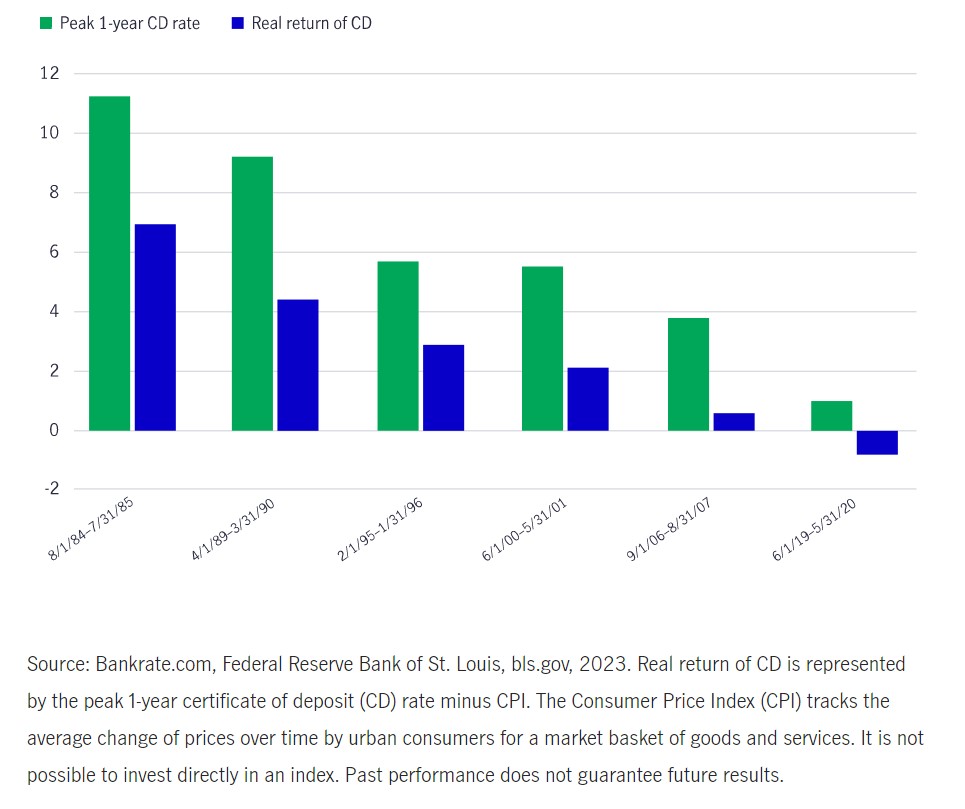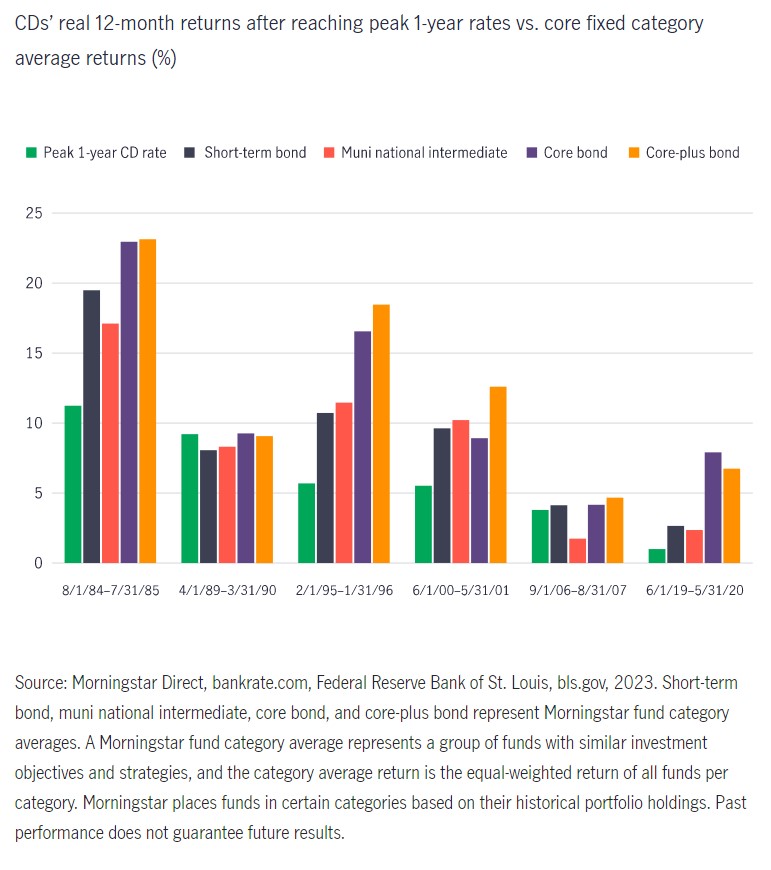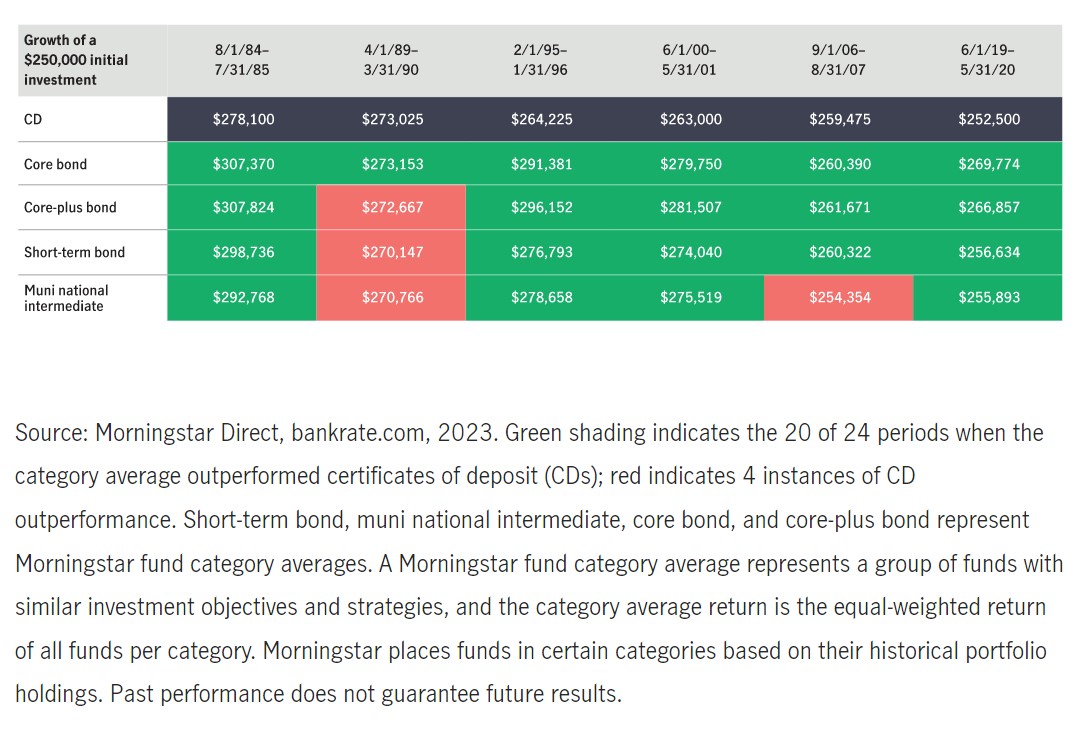Reading Time: 6 minutes
With the Federal Reserve’s recent increase in the federal funds rate, many banks have followed suit by raising their interest rates. This has caused mortgage interest rates to rise, which discourages borrowing, and also increases interest paid to savers. As a result, certificates of deposit (CDs) are now offering higher yields, making them an attractive option for short-term liquidity needs. While CDs may seem like a safe and secure investment choice, it’s important for investors to consider the long-term benefits of investing in the stock market. While high yield CDs are great for short-term needs, the stock market has historically provided greater yields and potential for long-term growth.
Why The Recent Yield Increases for CDs
As the U.S. central bank, the Federal Reserve tries to keep the economy steady using an important rate it can influence: the federal funds rate. This is roughly the cost of borrowing cash overnight between banks. Typically, the Fed lowers its rate to help stimulate the economy and raises it to help curb inflation. Banks generally follow the direction of the Fed funds rate in setting their rates on loans and savings accounts, including newly issued CDs. So a higher Fed rate can result in higher CD rates, but it’s not guaranteed and doesn’t happen instantly.
However, it’s important for investors to consider the long-term implications of their investment decisions and to weigh the benefits and limitations of CDs against other investment options. Remember, banks are not in the business of losing money. When they offer higher yields on CDs, banks can attract the capital they need to then reinvest the proceeds into even higher potentially yielding investments such as the stock market to maintain or increase their own profitability.
Limitations of CDs
- Limited returns: CDs typically offer limited returns compared to other investment options, such as the stock market. While the guaranteed return on a CD may seem attractive in the short-term, it may not provide enough growth to keep pace with inflation over the long-term. This means that the purchasing power of the returns on a CD may decrease over time, making it a less attractive option for those seeking long-term growth. Investors should be and have been rewarded over time for the cost of “stock market volatility.” This higher level of risk is reflected in the equity risk premium, which is the excess return that investors expect from holding equities over a risk-free asset such as government bonds.
- Lack of flexibility: CDs are typically inflexible investments, with a set maturity date and interest rate. This means that if interest rates rise after the CD has been invested in, the investor is locked into the lower rate until the CD matures. Additionally, early withdrawal from a CD typically incurs penalties, which can further reduce the returns on the investment.
- Inflation risk: Inflation is a key factor that can impact the returns on a CD. As the cost of goods and services rises over time, the purchasing power of a fixed return on a CD may decrease. This means that the returns on a CD may not keep pace with inflation, which can erode the value of the investment over time. Investors should consider this risk when deciding whether to invest in a CD and should consider the potential impact of inflation on their investment goals.
Although CDs provide relative safety, real returns may become negative after inflation is factored in. Take a look at the chart below that shows the real returns CDs generated in the six 12-month periods since 1984 that followed peaks in CD rates.

When comparing 12-month returns that followed the six peaks in CD rates since 1984, average returns across four Morningstar bond fund categories outpaced the CD returns in a large majority of the instances…about 83% of the time.

If you were to have invested $250,000 in CDs vs investing the same amount in bond funds during each of those six 12-month periods since 1984, here’s what would have happened. Historically, fixed income has outperformed more than 83% of the time.

In conclusion, while CDs may seem like a safe and secure investment option, they do have limitations that investors should consider. Investors who are seeking long-term growth and flexibility may be better served by investing in other options, such as the stock market.
Advantages of the Stock Market
We’ve looked at how CDs compare to the fixed income market above, so now let’s turn our attention to comparing CDs to the stock market. Here are seven advantages of the stock market compared to CDs: higher yields, potential for long-term growth, diversification opportunities, liquidity, potential for capital appreciation and income and flexibility.
- Historically higher yields: The stock market has traditionally provided higher returns compared to CDs. Over the long-term, stocks have delivered average returns of around 10% per year, while CDs typically have offered returns of 2-3%. This means that investing in the stock market has the potential to provide significantly higher returns over the long-term, especially when compared to CDs. It’s important to note that stock market returns are not guaranteed and can be subject to significant volatility in the short term, while CD yields are fixed and provide a more stable return.
- Potential for long-term growth: The stock market is a highly dynamic investment option that can provide long-term growth. As companies grow and expand, their stock prices can also increase, providing investors with the potential for substantial returns. Additionally, reinvesting dividends can compound returns over time, further increasing the potential for long-term growth.
- Diversification opportunities: Investing in the stock market provides investors with the opportunity to diversify their portfolios across multiple companies, industries, and even countries. This diversification helps to reduce risk, as the performance of any one stock is not likely to impact the entire portfolio. By spreading investments across a range of stocks, investors can potentially reduce the impact of any one investment on their overall portfolio.
- Liquidity: The stock market is a highly liquid investment option, with stocks that can be bought and sold quickly and easily. This means that investors can access their money when they need it, without having to wait for a CD to mature. Additionally, the stock market is open for trading five days a week, providing investors with the opportunity to buy and sell stocks at their convenience. Keep in mind, the stock market’s liquidity, or the ability to sell stocks quickly and easily, does not guarantee that an investor will be able to maintain the original capital invested. Volatility in the stock market can cause significant fluctuations in stock prices, which can impact an investor’s ability to sell stocks and maintain their original capital. In times of market volatility, stocks may become less liquid, as there may be fewer buyers or a decreased demand for certain stocks. This can result in a reduction in the price of the stock, which can impact an investor’s ability to sell and maintain their original capital.
- Potential for capital appreciation: One of the biggest advantages of the stock market is the potential for capital appreciation. As companies grow and expand, their stock prices can increase, providing investors with the potential for substantial returns. This potential for capital appreciation is not typically available with CDs, which offer fixed returns that are based on the interest rate.
- Opportunity for income: The stock market provides investors with the opportunity to earn income through dividends. Dividends are payments made by companies to their shareholders, and investing in stocks that pay dividends can provide a reliable source of income. CDs offer fixed returns that may not be enough to keep pace with inflation over time.
- Flexibility: The stock market provides investors with the flexibility to invest in a range of stocks and investment vehicles. This flexibility allows investors to tailor their investments to their specific investment goals, risk tolerance, and time horizon. CDs are typically less flexible, as they offer a fixed return that is based on the interest rate.
How Intelligent Investing Integrates Risk
Intelligent Investing believes there are typically three types of risk that every investor should know:
- My ability to take on risk (assets/income/goals)
- My willingness to take on risk (can I sleep at night with this much risk)
- My actual risk (what kind of risk do I actually have in my overall portfolio)
Intelligent Investing is leveraging technology and years of studying investor psychology to help answer these questions. If you want to know your risk number, click the link below for a five-minute questionnaire. If you are married, we highly recommend sitting down with your spouse and taking the questionnaire together. To learn more about our risk process, click here.
How Intelligent Investing Leverages Financial Technology
One of our unique factors is to leverage technology, and we have leveraged financial technology such as artificial intelligence to help craft the above blog. We have modified the results of the blog to reflect our opinions. Leveraging this technology helps us be more efficient and serve our high-net-worth clients in other ways.
If you would like to learn more about our proprietary Intelligrations™, we’d love to have a complimentary call or coffee with you. Click here to get started.
Conclusion
In conclusion, the stock market offers a range of advantages compared to CDs, especially for investors seeking long-term growth and diversification opportunities. While the stock market does come with some inherent risk, the potential for high returns and the opportunity to diversify and access professional management services make it a compelling option for many investors.
If the “risk-free” rate offered by CDs is decent, it’s worth considering the potential benefits of investing in riskier assets such as the stock market. While CDs may provide a low-risk, low-return investment option, the potential for higher returns from riskier investments such as stocks can be significantly greater over the long term.
Credits: This blog was written in part by ChatGPT, an AI language model developed by OpenAI. The content of this blog reflects the knowledge and opinions of ChatGPT. Although we have edited and modified the output to reflect our opinions, it may be protected by copyright laws. Please do not reproduce or distribute without giving proper credit to ChatGPT and OpenAI. Also, an article by John Hancock Investments: https://www.jhinvestments.com/viewpoints/investing-basics/CDs-or-bonds-Stash-cash-or-look-for-higher-potential-returns